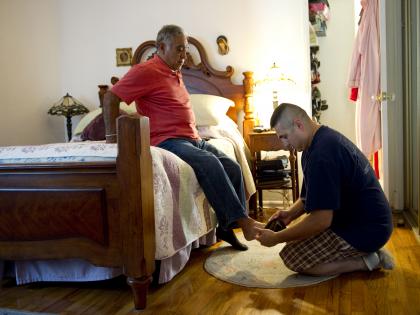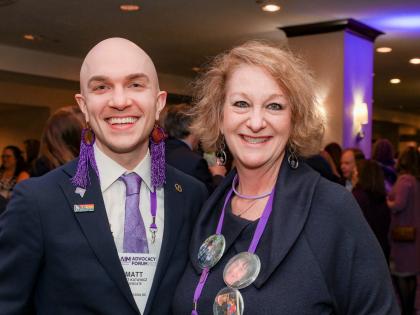Vermont State Alzheimer’s Plan Overview

In 1991, Vermont’s legislature enacted legislation that established the Governor’s Commission on Alzheimer’s Disease and Related Disorders. The Vermont Department of Disabilities, Aging and Independent Living (DAIL), in its efforts to design and develop the State Plan on Dementia, convened a subcommittee of the Governor’s Commission on Alzheimer’s Disease and Related Disorders and other aging network providers. This subcommittee was charged with providing guidance for the development of a plan to help state policymakers and stakeholders better understand how the estimated increase in people living with dementia will need to be met with a corresponding increase in resources; including caregivers, specialized care units, respite services and education. During 2007 and 2008, a State Plan on Dementia was developed. Soliciting feedback from community members, direct service providers, and families impacted by Alzheimer’s, the subcommittee published the Vermont State Plan on Dementia in 2009.
In 2022, the state released the 2022-2025 Vermont Action Plan for Alzheimer’s Disease, Related Dementias & Healthy Aging, led by the Vermont Health Department’s Alzheimer’s Disease and Healthy Aging Program and the State Unit on Aging at DAIL. More than 40 stakeholders, including the Vermont Chapter of the Alzheimer’s Association, and Vermonters with Alzheimer's and their caregivers, were engaged in the process. The new state plan highlights goals that are in alignment with the National Healthy Brain Initiative Road Map and the National Plan to Address Alzheimer’s Disease. These include enhancing public awareness and engagement; improving data to track progress; and accelerating action to reduce risk factors for dementia.
Vermont 2026 Policy Priorities

Increase Respite Funding for Dementia Caregivers
20,000 dementia caregivers in Vermont provided 29 million hours of unpaid care in 2025, often enabling their loved ones to live in the community instead of moving into costly residential communities. But this dedication often compromises the caregiver’s own well-being, with over half reporting chronic health conditions of their own. Respite care offers a necessary lifeline, allowing caregivers to address personal medical needs or take a vital break from their duties. The Alzheimer’s Association is calling on state lawmakers to increase funding for the Dementia Respite Grant to $750,000. Current funding levels are insufficient to meet the growing need, leaving many families without the support required to avoid caregiver burnout and premature nursing home placement.

Improve Access to Biomarker Testing
With the historic Food and Drug Administration (FDA) approval of treatments that slow the progression of Alzheimer’s in the early stages, early detection and diagnosis are even more critical to ensure individuals receive the most benefit at the earliest point possible. Biomarkers offer one of the most promising paths to improve dementia detection, diagnosis and treatment. Yet these critical tests remain out of reach for many as insurance coverage is failing to keep pace with innovations and advancements in treatments. The Alzheimer’s Association is urging state lawmakers to expand insurance coverage of comprehensive biomarker testing. Without this legislation, dementia diagnoses may take up to two years, increasing the long-term costs to the individual, family and the state.
Vermont State Advocacy Day
Alzheimer’s Awareness Day at the Statehouse is a special opportunity to come together, learn, and raise awareness with our elected leaders. You’ll hear from policymakers, share your own story, and advocate for priorities that matter to families impacted by Alzheimer’s and other dementias. Participants will be recognized in the House Chamber and take part in a press conference highlighting the importance of access to biomarker testing and expanded support for unpaid dementia caregivers. It’s a day of impact, connection and hope.
Sign Up to Learn About Advocacy Opportunities in Vermont

Find My Chapter
Together, we’re making an impact. Find an Alzheimer’s Association chapter in your community for more ways to engage.
Contact Us
State Affairs Contact: Jenny Horgan
Phone: 603.403.3327
Email: jchorgan@alz.org
12,800
people living with Alzheimer’s in Vermont
20,000
Vermonters are providing unpaid care
$158 Million
Medicaid cost of caring for people living with Alzheimer’s (2025)
145.5%
increase in Alzheimer’s deaths 2000-2022
17%
in hospice with a primary diagnosis of dementia
20%
increase of geriatricians in Vermont needed to meet the demand in 2050
Resources to Drive Change in Vermont
The following resources developed by AIM and the Alzheimer’s Association will help you learn more about the issues impacting people living with Alzheimer’s and their caregivers, how Vermont policymakers are addressing these gaps, and how you can help drive change.